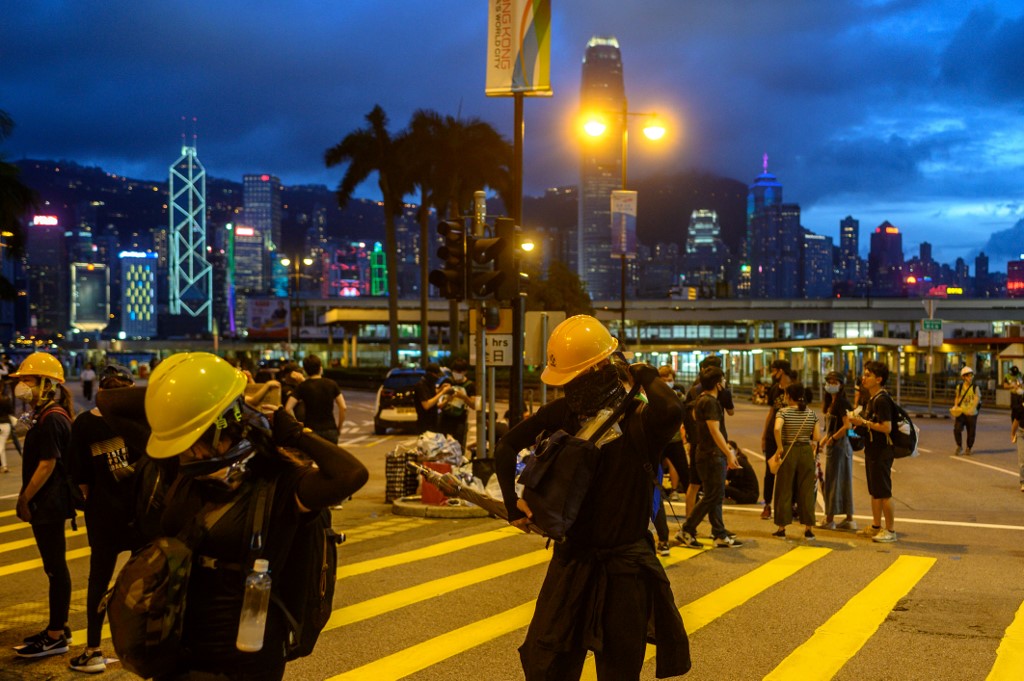Pro-democracy protesters in Hong Kong erected barricades in a popular tourist district and briefly blocked a major tunnel Saturday evening, defying increasingly stern warnings from China over weeks-long unrest that has plunged the city into crisis.
The semi-autonomous southern Chinese financial hub has seen two months of protests and clashes triggered by opposition to a planned extradition law that quickly evolved into a wider movement for democratic reforms.
Authorities in Hong Kong and Beijing this week signaled a hardening stance, including with the arrests of dozens of protesters, and the Chinese military saying it was ready to quell the “intolerable” unrest if requested.
But protesters have remained unyielding, vowing to hold multiple occupations and rallies into next week, sending tensions soaring once more.
On Saturday they embraced their mantra “be water” — a philosophy of unpredictability espoused by local martial arts legend Bruce Lee — in a bid to keep police guessing.
Throughout the evening they put up makeshift barricades across multiple roads in Tsim Sha Tsui, a popular shopping and tourist district on the harbor front, where many luxury malls and hotels shut their doors.
They also blocked one of the three cross-harbor tunnels connecting to the main island, causing widespread traffic chaos, before disappearing after half an hour.
“We will fight as guerrillas today and be water,” a masked and helmeted 19-year-old, who gave her surname Lee, told AFP.
In a statement, police called on protesters to “stop their illegal acts” and told members of the public to avoid the area.
– City-wide strike –
Many of the chants and graffiti tags that were thrown up called for residents to join a planned strike on Monday.
“The more the government suppresses us, the more we will come out until the government responds to our demands,” protester Ah Kit, 36, told AFP.
Two marches are also planned for Sunday — one on Hong Kong island and the other in the Tseung Kwan O district — as well as a city-wide strike on Monday and rallies in seven locations.
The call for strike action appears to be gaining more traction than previous walkouts, with a host of organisations and unions vowing to join.
Hong Kong has witnessed eight consecutive weekends of huge rallies — often followed by violent clashes between police and small groups of hardcore protesters.
Under the terms of the 1997 handover deal with Britain, the city has rights and liberties unseen on the Chinese mainland, including an independent judiciary and freedom of speech.
But many say those rights are being curtailed, citing the disappearance into mainland custody of dissident booksellers, the disqualification of prominent politicians and the jailing of pro-democracy protest leaders.
Public anger has been compounded by rising inequality and the perception that the city’s distinct language and culture are being threatened by ever-closer integration with the Chinese mainland.
On Saturday evening, protesters tore down the Chinese flag from a pole on the waterfront and threw it in the harbor.
– Violence escalating –
The past two weekends have seen a surge in violence used by both protesters and police, who have repeatedly fired rubber bullets and tear gas to disperse projectile-throwing crowds.
A mob of pro-government thugs also attacked demonstrators, putting 45 people in hospital.
Hong Kong’s police have increasingly adopted tougher tactics, including this week charging 44 protesters with rioting — an offence that carries up to 10 years in jail.
Hong Kong chief executive Carrie Lam has made few concessions beyond agreeing to suspend the extradition bill and shied away from public appearances.
Protesters are demanding her resignation, an independent inquiry into police tactics, an amnesty for those arrested, a permanent withdrawal of the bill, and the right to elect their leaders.
Thousands of pro-government supporters also held a rally in a separate park on Saturday, many waving Chinese flags and chanting slogans in support of the police — who have refuted allegations of using excessive force.
Beijing has increasingly pitched the anti-government protests as funded by the West.
China has provided little evidence beyond supportive statements from some Western politicians and critics say Beijing’s accusations of foreign meddling ignore Hongkongers’ legitimate grievances.





Reader Interactions